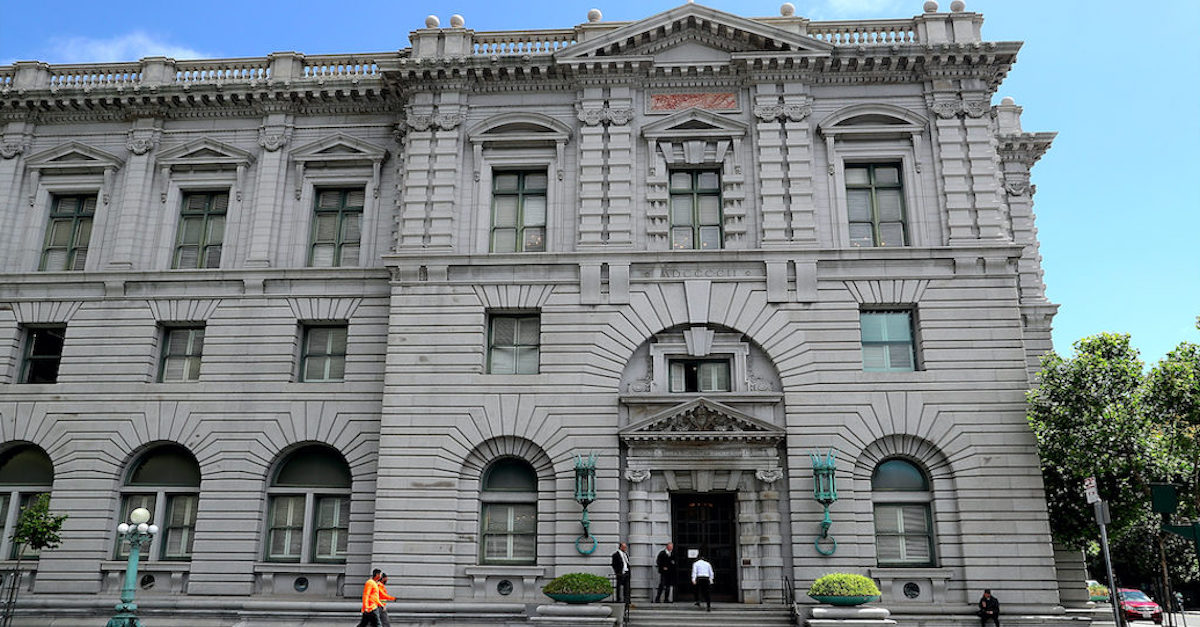
U.S. Court of Appeals for the 9th Circuit
A federal appeals court ruled Monday that California attempted to wield too much control over how the federal government handles immigrant detainees and struck down the state’s 2019 ban of private detention centers.
The full U.S. Court of Appeals for the Ninth Circuit ruled 8-3 that California lacks the authority to interfere with the federal government’s handling of immigrants awaiting deportation hearings. Most immigrants held prior to deportation proceedings are housed in private facilities, the vast majority of which are operated by two large companies: GEO Group and CoreCivic Inc. Many others are owned by smaller companies.
According to court findings, “virtually all” ICE detainees in the Golden State are held in privately owned and operated facilities. In 2019, California enacted Assembly Bill (AB) 32, which states that “a person shall not operate a private detention facility within the state.” The effect of the bill, according to the Ninth Circuit, would be that ICE must “entirely transform its approach to detention in the state or else abandon its California facilities.”
The California law was written by former Assemblyman and current California Attorney General Rob Bonta (D), who’s now the state’s attorney general. Bonta’s office argued the case before the Ninth Circuit. The bill was signed into law by Gov. Gavin Newsom in 2019 (D).
The problem with California’s legislation, according to GEO group and the Ninth Circuit, lies in the Supremacy Clause of the U.S. Constitution. While states are free to impose constraints on private industry, states are prohibited by the Supremacy Clause from interfering with or controlling the operations of the federal government.
The federal government and GEO sued seeking to enjoin enforcement of California’s law, and their separate lawsuits were consolidated into one by the district court. Both the government and GEO moved for a preliminary injunction and California moved to dismiss the case.
At the district court level, California prevailed, and the court dismissed the lawsuit. On appeal, a divided three-judge panel of the Ninth Circuit reversed and sided with the Biden Administration and GEO.
California appealed to the en banc Ninth Circuit and argued that appellants’ claims are not justiciable and that any injury to be suffered is “speculative” because ICE may never choose to extend its private contracts.
The eight judges that sided against California included three Donald-Trump appointees (Circuit Judges Ryan D. Nelson, Kenneth K. Lee, and Danielle J. Forrest), three Barack Obama appointees (Circuit Judges Jacqueline H. Nguyen, Paul J. Watford, and John B. Owens), and two George W. Bush appointees (Circuit Judges Milan D. Smith, Jr. and Sandra S. Ikuta).
Writing for the Ninth Circuit’s 8-member majority, Nguyen found California’s law to overreach state authority:
AB 32 would override the federal government’s decision, pursuant to discretion conferred by Congress, to use private contractors to run its immigration detention facilities. It would give California a “virtual power of review” over ICE’s detention decisions, Leslie Miller, Inc. v. Arkansas, 352 U.S. 187, 190 (1956) (per curiam), and allow the “discretion of the federal officers [to] be exercised . . . only if the [state] approves.” Pub. Utils. Comm’n, 355 U.S. 534, 543 (1958). Whether analyzed under intergovernmental immunity or preemption, California cannot exert this level of control over the federal government’s detention operations. AB 32 therefore violates the Supremacy Clause.
Nguyen also provided some context for ICE’s use of private facilities, and noted the “practical and legal constraints” that inform the agency’s decisions.
“Congress has expressed that the Secretary should favor the use of existing facilities for immigration detention, whether through purchase or lease,” Nguyen explained. Further, the amount and location of detained individuals tends to fluctuate, thus requiring ICE to “maintain flexibility.” Taken together with another California law that prohibits local governments from contracting to expand immigration detention facilities, ICE essentially has no choice but to contract with private companies or other federal agencies.
As Nguyen put it, “From ICE’s perspective, AB 32 leaves no good options.”
ICE could, Nguyen said, shift the detainees to outside California, but that would require difficult logistics and could overcrowd out-of-state facilities.
In the court’s ruling against California, Nguyen said the decision was based on a “foundational idea” of intergovernmental immunity that has its roots in the 1819 seminal case McCulloch v. Maryland.
By imposing “an outright ban on hiring any private contractor” on ICE, “AB 32 would breach the core promise of the Supremacy Clause,” reasoned Nguyen. Legal limits on California’s power “cannot be squared with the dramatic changes that AB 32 would require ICE to make,” the judge continued.
The court’s ruling is still a preliminary one that allows a pretrial injunction. However, the court’s basis for issuing its order — that the movants are likely to prevail on their underlying claim that AB 32 is illegal — is an indicator of the litigation’s likely future.
Three judges appointed by Democrats dissented from the majority’s ruling: Chief Judge Mary H. Murguia (appointed by Barack Obama), and Circuit Judges Johnnie B. Rawlinson (appointed by Bill Clinton), and Jennifer Sung (appointed by Joe Biden).
The dissenters found that AB 32, “neither directly regulates nor discriminates against the federal government,” and as such, it does not violate the Supremacy Clause. The three, though, did not take issue with the majority’s finding that AB 32 would result in serious issues for ICE.
Rather, Murguia specifically acknowledged in the dissent that, “AB 32 substantially interferes with important federal operations,” and allowed, “it may well be that the law should be invalidated under the intergovernmental immunity doctrine.” However, under applicable Supreme Court precedent, Murguia argued, AB 32 does not constitute a sufficiently “direct” regulation as to run afoul of federalism.
[image via Justin Sullivan/Getty Images]
Have a tip we should know? [email protected]